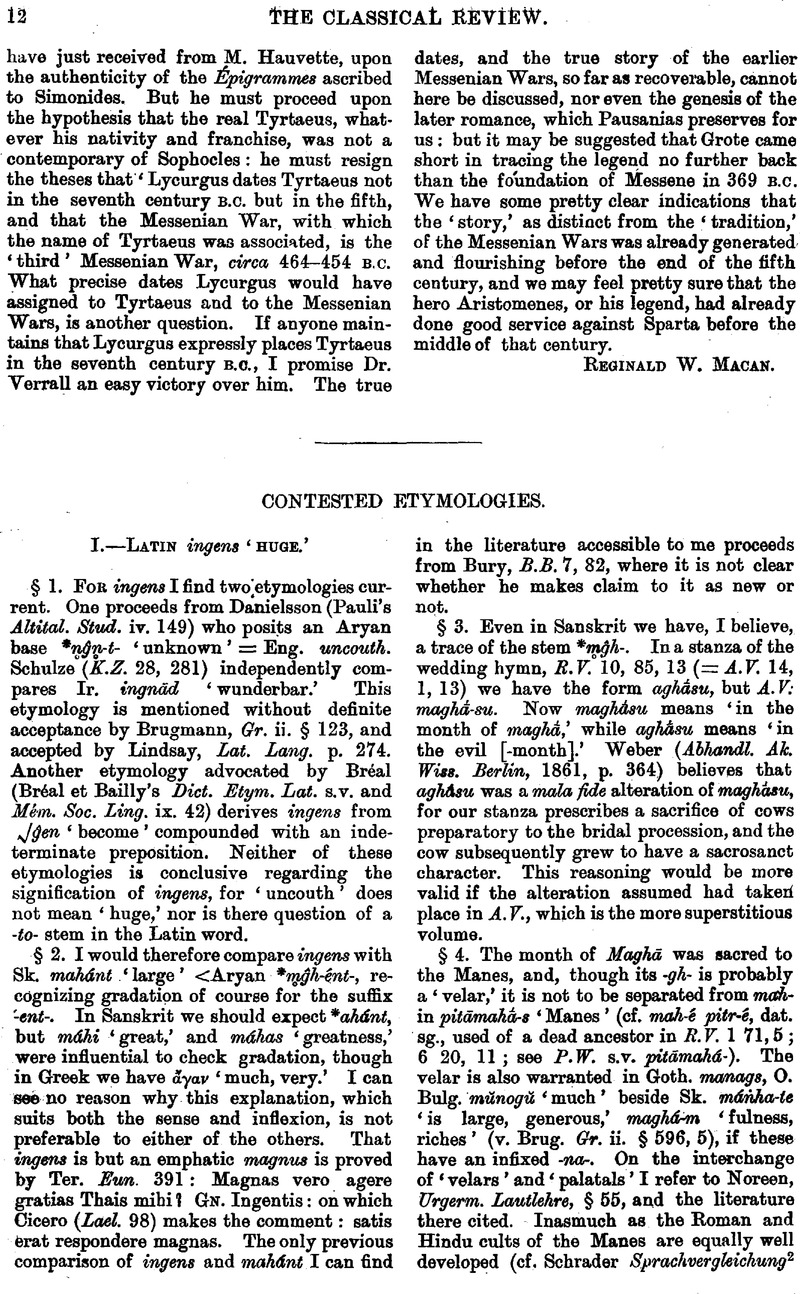No CrossRef data available.
Article contents
Abstract

Information
- Type
- Review Article
- Information
- Copyright
- Copyright © The Classical Association 1897
References
page 13 note 1 The relation of Mains to the name Magius and to maior was seen by Aufrecht, K.Z. 1, 231; he defined Mains as ‘der wachstum verleihende.’ In the same sens Corasen expressed himself (ib. 3, 278; 11, 327). Grassmann (ib. 16, 171) compared the Tusculan Jupiter Mādus with Indra Maghavan. See also Ascoli ib. 17, 274.
page 13 note 2 Cf. Aen. ix. 706: phalarica—fulminis acta modo; x. 38 actam nubibus Irim.
page 13 note 3 I add here another example of this interchange; noting that ἅμαξα ‘wain’ means in Hesiod ‘ploughcarriage’ we can connect ὅφατα δεσμο⋯ ⋯ρ⋯τρων ‘plough-frame’ ⋯φν⋯ς ἅροτρον ‘ploughshare’ ‘Hesychius’ with ⋯χος ‘cart’ √veĝh- ‘move along.’ I shall have to discuss this question in an article on cortex: cortina.
page 13 note 4 Cf. also Festus s.v. Manuos: in carminibus saecularibus [i.e. saliaribus] Aelius Stilo significare ait bonos. Et inferi di Manes pro boni dicuntur a suppliciter eos venerantibus propter metum mortis, ut immanes quoque pro valde [non bonis] dicuntur.
page 14 note 1 For another less probable etymology of ⋯με⋯νων from ![]() gwen see Proc. Am. Phil. Assoc. Dec. 1895, p. liii.
gwen see Proc. Am. Phil. Assoc. Dec. 1895, p. liii.
page 14 note 2 Stokes (Fick, Wört.4 ii. 199) writes pre-Celtic mati-s, matos on the basis of Gallic Mati-donnus, Teuto-matos: otherwise the Irish form might be referred to *mad-. Bezzenberger adds ‘![]() Hesych?’ I would correct Hesychius to ματ⋯ς (cf. μ⋯ ‘seer’) μ⋯γος etc. Further glosses are
Hesych?’ I would correct Hesychius to ματ⋯ς (cf. μ⋯ ‘seer’) μ⋯γος etc. Further glosses are ![]() . This ματ⋯ρ has been corrected to μαστ⋯ρ, but its genuineness seems to be attested by ματ⋯α, μαρτυρ⋯α, for a μαρτυρ⋯ρι is glossed by βουλ⋯σεις ‘meaning, signification’ we may define ματ⋯ρ and ματ⋯ς by ‘interpreter.’ Note also
. This ματ⋯ρ has been corrected to μαστ⋯ρ, but its genuineness seems to be attested by ματ⋯α, μαρτυρ⋯α, for a μαρτυρ⋯ρι is glossed by βουλ⋯σεις ‘meaning, signification’ we may define ματ⋯ρ and ματ⋯ς by ‘interpreter.’ Note also ![]() ‘search.’
‘search.’
page 14 note 3 I am not myself convinced that gh is prior to g; gh may have been developed from an intervocalic g at the end of a syllable plus a ‘glottal buzz’ before the next vowel; cf. Vietor, Germ. Pronunc.2 p. 57 and the author, Am. Jr. Phil. xvi. 23.
page 14 note 4 I cannot see why μ⋯θος ‘toil’ μοθερ⋯ς ‘toilsome’ should not be brought into this group. No authority is to be given to the σ of the gloss of Hesychius: ![]() because of his
because of his ![]() etc. For the signification I note that Cicero not only says magnum opus et arduum, but also magnum est efficere etc.; cf. Od. θ. 261 μ⋯θα ἔρθον.
etc. For the signification I note that Cicero not only says magnum opus et arduum, but also magnum est efficere etc.; cf. Od. θ. 261 μ⋯θα ἔρθον.
page 14 note 5 Have we not this treatment of initial mno in thec words for ‘name’ ?—⋯νομα [with ⋯ for ἄ by assimilation to the following o, cf. Joh. Schmidt, K. Z. 32, 370; this assimilation seems to occur only with unaccented ⋯, say from gen. ⋯ν⋯ματος], and nō-men <*mnomen: √men think; at any rate O. Truss, emmens may be interpreted as ![]() being the weakest grade of mnō-. This explanation will absolve the forms without resorting, as Bartho-lomae does, to six grades (B.B. 17, 132). If Cymric enw and Armen. anun allow us to operate with a stem in ven- beside -men, then
being the weakest grade of mnō-. This explanation will absolve the forms without resorting, as Bartho-lomae does, to six grades (B.B. 17, 132). If Cymric enw and Armen. anun allow us to operate with a stem in ven- beside -men, then ![]() ‘nameless’ may be dissimilated from *αν-ών-υνος; ω is in any case such a lengthening as we see in σοφώτεροσ (cf. infra, vii. § 14). I should myself however take -υμος for -υμνος, cf. νώνυμος alternating with νώνυος ‘nameless’ υ being an anaptyptic vowel as in θυν⋯.
‘nameless’ may be dissimilated from *αν-ών-υνος; ω is in any case such a lengthening as we see in σοφώτεροσ (cf. infra, vii. § 14). I should myself however take -υμος for -υμνος, cf. νώνυμος alternating with νώνυος ‘nameless’ υ being an anaptyptic vowel as in θυν⋯.
page 15 note 1 As to Bezzenbeger's comparison of OHG. entire, andisc ‘antiquus’ O. E. ent ‘giant’ <*anta (B.B. 1, 342), I can but believe he is operating with a loan-word, antiquus. The connection of ideas is vouched for by the Biblical phrase: ‘There were giants in those days’—the days of yore; cf. Leo (Gloss, p. 472) who says of O.E. ent: ‘hat aber zugleich den anspielenden Begriff des alten: enta geveorc ein Werk der Riesen sc. der Vorzeit, der Urzeit.’ Our word antic shows cognate meanings.
page 15 note 2 The -t- of Sk. ![]() , βροτ⋯ς and of Sk. martya ‘mortal’ must also be noted. There is doubtless ultimate kinship between βροτ⋯ς and ⋯ν⋯ρ, the relation being probably that of ‘slain’ and ‘slayer.’
, βροτ⋯ς and of Sk. martya ‘mortal’ must also be noted. There is doubtless ultimate kinship between βροτ⋯ς and ⋯ν⋯ρ, the relation being probably that of ‘slain’ and ‘slayer.’

